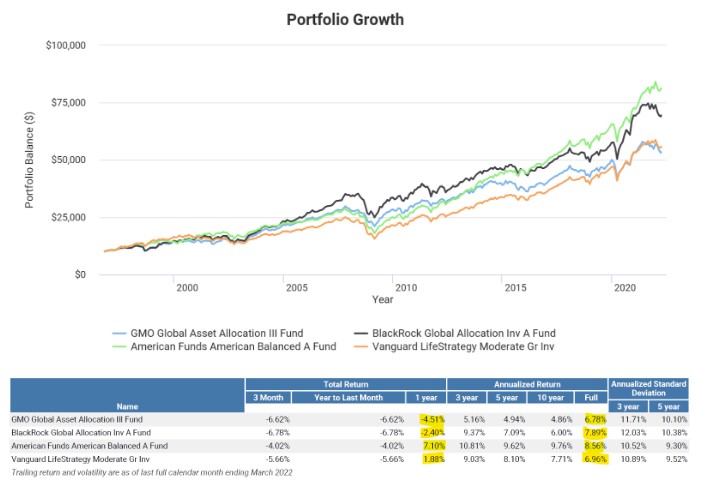Tzvi Shuster thought it was time for a new investment plan. He’d done well with a simple portfolio of index funds, but the world had gotten really complicated. Surely, talented money managers who could nimbly jump from investment to investment would excel in a volatile environment. Picking a solid investment manager and giving them full power made sense to him. Asset allocation mutual funds offered him that option, and he was ready to pull the trigger.
Does an unconstrained investment mutual fund offer better results than a balanced passive portfolio?
Investment Freedom is No Slam Dunk
Asset allocation mutual funds give their investment manager(s) the freedom to buy and sell almost any investment in the world. This mandate is very different from the constraints placed on typical mutual funds, which must stick to one type of investment. Asset allocation managers constantly evaluate the global economy and economic trends to decide where and how to invest, and they are open to choosing whichever opportunity arises.
You might imagine that the returns on these super-flexible funds, run by some of Wall Street’s best and brightest, would blow simple index fund options away…but they don’t.

Some Examples
GMO, BlackRock, and American Fund (Capital Group) run three of the oldest and most respected go-anywhere funds. The funds charted here have minimal constraints on what they can invest in (though the American Funds Balanced fund isn’t as flexible as the other two). As you can see, over the long term (November 1996–March 2022), the funds did reasonably but not spectacularly well. Note also how in the short term there was a stark difference in performance between the three; since the managers can invest flexibly and build very different portfolios, it makes sense that their returns will vary, especially over the short run.
Versus “Set It and Forget It”
Opposed to the go-anywhere style of asset allocation funds is the “set it and forget it” approach. Passive portfolios set a balanced allocation (of stocks, bonds, and cash) and invest in a number of different index funds to get exposure. They then continually rebalance the portfolio to stay within the initial allocation. One prime example is the Vanguard LifeStrategy Moderate Growth Fund. This low-cost fund has a 60% equity (approximately 35% US and 25% international) and 40% bonds allocation, which is similar to the thresholds of the go-anywhere funds and makes a good benchmark to compare with.
The Results Aren’t Compelling
Over the past 25 years, the simple index option comes in third out of the four. But over the past 10 years, the Vanguard fund beat two out of the three unconstrained money managers. Will Tzvi pick the manager that will be the winner over the next 10 years? Note that the long-term winner in this comparison underperformed for many years (follow the green line). Would Tzvi have stuck with the underperformer long enough to reap the gains? If you aren’t willing to stick with an investment for a long period of time in order to let the manager’s ideas and themes play out, you’ll probably come out a loser.
Freedom has a Price
As with everything in life, there is a cost to hiring an investment manager. Furthermore, the more activity in the fund, the more it costs to research and trade the holdings. The three asset allocation funds listed above carry expense ratios of 0.63%, 1.08%, and 0.56% respectively, compared to the Vanguard LifeStrategy fund’s 0.13%. Active allocation managers must earn a significantly greater amount of return on their investments to be able to pay their fees and beat a low-cost competitor like Vanguard LifeStrategy. Costs are a big part of the reason go-anywhere funds struggle to beat low-cost, simple alternatives.
Let’s Not Forget About Taxes
After taxes, the potential outperformance of the active asset allocation funds becomes even less alluring (assuming you’re investing in a taxable account). Using Morningstar’s tax cost ratio, this is how the funds stack up after taxes:
| Three-Year Tax Cost Ratio* | Three-Year After Tax Return** | |
| GMO Global Asset Allocation III Fund | 1.86 | 3.3% |
| BlackRock Global Allocation Inv A Fund | 2.51 | 6.9% |
| American Funds American Balanced A Fund | 1.21 | 9.6% |
| Vanguard LifeStrategy Moderate Gr Inv Fund | 0.98 | 8.1% |
*The Morningstar tax cost ratio measures how much a fund’s annualized return is reduced by the taxes investors pay on distributions.
**Estimated after-tax return: three-year annualized return minus the three-year Morningstar tax cost ratio.
Active funds tend to have large distributions of capital gains—and therefore taxes—because they move in and out of investments more frequently than passive funds. Note how before taxes are taken into consideration, the Vanguard LifeStrategy fund is in third place, but after taxes, it beats the BlackRock fund and absolutely crushes the GMO fund.
Using the Past to Predict the Future
Even based on the results of three venerable go-anywhere funds, I’d still say the case for them isn’t compelling. And will these successful managers keep doing well? Over the course of those 25-plus years, there have been plenty of other asset allocation funds that have closed up shop due to poor performance. Then again, perhaps some newer asset allocation fund will become the next generation’s star. Picking the right emerging manager in advance is extraordinarily difficult; why does Tzvi think he can do so?
Built-In Advantages of Simple Indexed Portfolios
On the other hand, index-based strategies have systematic advantages which should persist. A rules-based portfolio can be sustained permanently—it doesn’t count on the skill of any one manager, and the cost advantage should be permanent. It’s logical to predict that a passive portfolio will continue being top-performing. The simple path has done really well in the past and will likely continue doing so in the future.